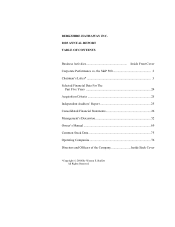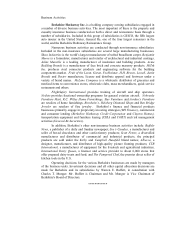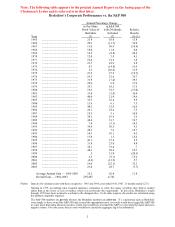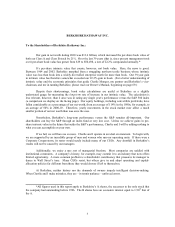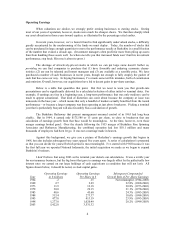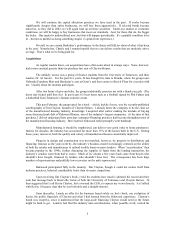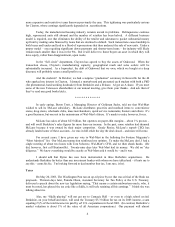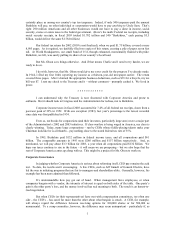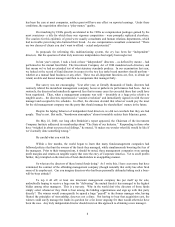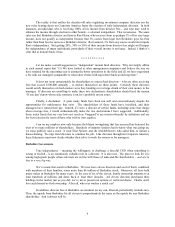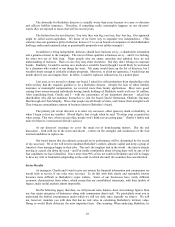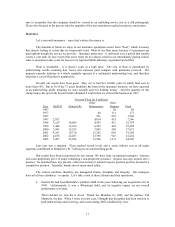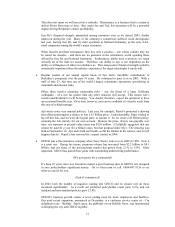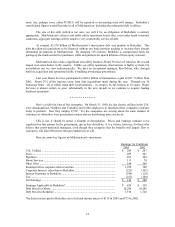Berkshire Hathaway 2003 Annual Report Download - page 9
Download and view the complete annual report
Please find page 9 of the 2003 Berkshire Hathaway annual report below. You can navigate through the pages in the report by either clicking on the pages listed below, or by using the keyword search tool below to find specific information within the annual report.8
has been the case at most companies, neither grant will have any effect on reported earnings. Under these
conditions, the negotiation often has a “play-money” quality.
Overreaching by CEOs greatly accelerated in the 1990s as compensation packages gained by the
most avaricious– a title for which there was vigorous competition – were promptly replicated elsewhere.
The couriers for this epidemic of greed were usually consultants and human relations departments, which
had no trouble perceiving who buttered their bread. As one compensation consultant commented: “There
are two classes of clients you don’ t want to offend – actual and potential.”
In proposals for reforming this malfunctioning system, the cry has been for “independent”
directors. But the question of what truly motivates independence has largely been neglected.
In last year’ s report, I took a look at how “independent” directors – as defined by statute – had
performed in the mutual fund field. The Investment Company Act of 1940 mandated such directors, and
that means we’ ve had an extended test of what statutory standards produce. In our examination last year,
we looked at the record of fund directors in respect to the two key tasks board members should perform –
whether at a mutual fund business or any other. These two all-important functions are, first, to obtain (or
retain) an able and honest manager and then to compensate that manager fairly.
Our survey was not encouraging. Year after year, at literally thousands of funds, directors had
routinely rehired the incumbent management company, however pathetic its performance had been. Just as
routinely, the directors had mindlessly approved fees that in many cases far exceeded those that could have
been negotiated. Then, when a management company was sold – invariably at a huge price relative to
tangible assets – the directors experienced a “counter-revelation” and immediately signed on with the new
manager and accepted its fee schedule. In effect, the directors decided that whoever would pay the most
for the old management company was the party that should manage the shareholders’ money in the future.
Despite the lapdog behavior of independent fund directors, we did not conclude that they are bad
people. They’ re not. But sadly, “boardroom atmosphere” almost invariably sedates their fiduciary genes.
On May 22, 2003, not long after Berkshire’ s report appeared, the Chairman of the Investment
Company Institute addressed its membership about “The State of our Industry.” Responding to those who
have “weighed in about our perceived failings,” he mused, “It makes me wonder what life would be like if
we’ d actually done something wrong.”
Be careful what you wish for.
Within a few months, the world began to learn that many fund-management companies had
followed policies that hurt the owners of the funds they managed, while simultaneously boosting the fees of
the managers. Prior to their transgressions, it should be noted, these management companies were earning
profit margins and returns on tangible equity that were the envy of Corporate America. Yet to swell profits
further, they trampled on the interests of fund shareholders in an appalling manner.
So what are the directors of these looted funds doing? As I write this, I have seen none that have
terminated the contract of the offending management company (though naturally that entity has often fired
some of its employees). Can you imagine directors who had been personally defrauded taking such a boys-
will-be-boys attitude?
To top it all off, at least one miscreant management company has put itself up for sale,
undoubtedly hoping to receive a huge sum for “delivering” the mutual funds it has managed to the highest
bidder among other managers. This is a travesty. Why in the world don’ t the directors of those funds
simply select whomever they think is best among the bidding organizations and sign up with that party
directly? The winner would consequently be spared a huge “payoff” to the former manager who, having
flouted the principles of stewardship, deserves not a dime. Not having to bear that acquisition cost, the
winner could surely manage the funds in question for a far lower ongoing fee than would otherwise have
been the case. Any truly independent director should insist on this approach to obtaining a new manager.

